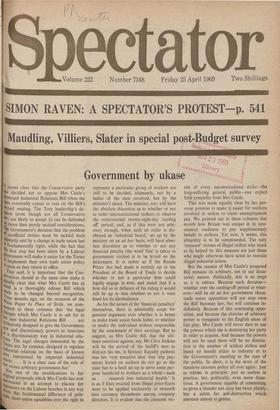Government by ukase
That said, it is important that the Con- servatives should at the same time make it equally clear that what Mrs Castle has in niuld is a thoroughly odious Bill which leads to be changed beyond recognition. lltree months ago, on the occasion of the White Paper In Place of Strife, we com- mented in these columns that 'the legal ebhanges which Mrs Castle is to ask for in her new Industrial Relations Bill . . . are pusively designed to give the Government i"eW and discretionary powers to intervene till a discriminatory way in industrial rela- 1,°°s. The legal changes demanded by the indindustrial are, by contrast, designed to regulate ustrial relations on the basis of known 4's interpreted by impartial industrial j:t1rts . . . It is a clear case of the rule of w versus arbitrary government fiat.' ,Not one of the modifications to her a:ginal proposals which Mrs Castle has now oin(Muced in an attempt to placate her 41),1onents on the Labour benches in any way titer. In this fundamental difference of prin- Neter-union squabbles over the right to represent a particular group of workers are still to be decided, ultimately, not by a ballot of the men involved, but by the minister's ukase. The minister, too, will have the absolute discretion as to whether or not to order unconstitutional strikers to observe the controversial twenty-eight-day 'cooling off' period; and, as if this were not arbi- trary enough, when such an order is dis- obeyed an 'industrial board,' set up by the minister on an ad hoc basis, will have abso- lute discretion as to whether or not any financial penalty (the word 'fine' is taboo in government circles) is to be levied on the miscreants. It is rather as if the Resale Prices Act had made it entirely up to the President of the Board of Trade to decide whether or not a particular firm could legally engage in RPM, and stated that if a firm did so in defiance of his ruling it would still be up to him whether or not it were fined for its disobedience.
As for the nature of the 'financial penalties' themselves, there is admittedly scope for genuine argument over whether it is better to make trade union funds liable, or whether to mulct the individual strikers responsible by the attachment of their earnings. But to suggest, as Mrs Castle did, that the ulti- mate sanctions against, say, Mr Clive Jenkins will be the arrival of the bailiff's men to distrain his MG, is farcical. Equally pathetic was her 'very tentative idea' that 'any pay- ments levied on strikers do not go to the state but to a fund set up to serve some pur- pose beneficial to workers as a whole—such as . . . research into industrial health.' It is as if fines exacted from illegal price-fixers were to be applied exclusively to research into coronary thrombosis among company directors. It is evident thaithe innocent vic- tim of every unconstitutional strike—the long-suffering general public—can expect little sympathy from Mrs Castle.
This was made equally clear by her per- verse promise to make it easier for workers involved in strikes to claim unemployment pay. We pointed out in these columns last month how Britain was unique in its non- sensical readiness to pay supplementary benefit to strikers. Yet now, it seems, this absurdity is to be compounded. The only `innocent' victims of illegal strikes who stand to be helped by this measure are just those who might otherwise have acted to restrain illegal industrial action.
But the essence of Mrs Castle's proposed Bill remains its arbitrary, not to say dicta- torial, nature. Politically, this is as inept as it is odious. Because each decision— whether over the cooling-off period or what- ever—will be an ad hoc government ukase, trade union opposition will not stop once the Bill becomes law, but will continue in- definitely. Because of this continuing oppo- sition, and because the exercise of arbitrary power is repugnant to the English sense of fair play, Mrs Castle will never dare to use the powers which she is destroying her party in order to acquire. And because the powers will not be used there will be no diminu- tion in the number of wildcat strikes and hence no benefit either to industry or to the Government's standing in the eyes of the public. In short, it is the story of the statutory incomes policy all over again : just as odious in principle; just as useless in practice, but, politically, even more disas- trous. A government capable of committing so gross a blunder not once but twice plainly has a talent for self-destruction which-- amounts almost to genius.










































